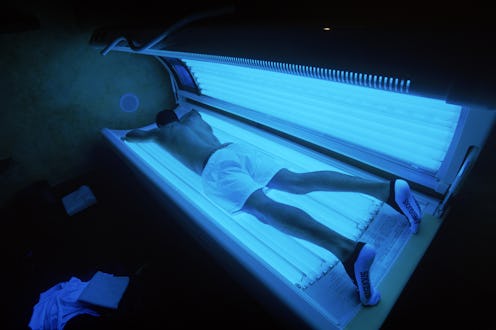News
Are Tanning Beds Worse for You Than Cigarettes?
Nothing says sexy like exhaling smoke from a perfectly bronzed face, especially when everyone else is working the post-Hercules greenish-white skin. But if you've acquired the tan artificially, watch out: a new study is suggesting that tanning beds may be behind a greater number of cancer cases than smoking cigarettes. You wouldn't be alone, though — the study shows that 43 percent of college students have used a tanning bed in the last year alone, and over 35 percent of American adults report using a tanning bed at least once in their lifetime.
The study, published in the Journal of the American Medical Association – Dermatology Wednesday, looked at the results of 88 previous studies. Like other research has suggested, using tanning beds is shockingly popular: 59 percent of university students and 17 percent of teens report having tried a sunbed in their lifetimes, with 13 percent of adults and 10 percent of teens having used one in the last year. What's new, though, is the suggestion that the number of skin cancer cases is also remarkably high — even higher than the cases of lung cancer caused by smoking.
"Overall, we estimate 419 039 cases of basal and squamous cell carcinoma (NMSC) and 10 888 cases of melanoma each year attributable to indoor tanning," says the study. "To put this in perspective, approximately 362 941 cases of lung cancer are attributable to smoking each year in these regions (using the most recent estimates of annual incidence of lung cancer of 226 160 in the United States,166 915 in Northern and Western Europe, and 10 193 in Australia, assuming that 90% of lung cancer cases are attributable to smoking)."
For women between the ages of 25 to 29, melanoma is in fact the top cancer killer — and, according to the National Melanoma Awareness Project, the rate of melanoma has doubled in the last three decades.
“If you’ve ever been in a tanning bed it increases your risks for melanoma by more than 75 percent,” Dr. Lisa Rhodes of Westlake Dermatology in Austin told KEYE-TV. “If you develop melanoma and it’s not caught early enough it can metastasize and spread through the body and there are not good cures for metastatic melanoma, yet.”
As it stands, several states — including California, Illinois, Nevada, Texas and Vermont — have taken steps to help reduce skin cancer cases, baning the use of tanning beds for anyone under the age of 18. At least 33 other states also have some sort regulations in place for minors. Still, some others, like Florida, have more tanning salons than McDonald’s restaurants or CVS stores.
Another similarity between smokers and tanners? Just like between 50 and 83 percent of patients will keep smoking even after being told they have lung cancer, one in seven women continue to tan after a skin cancer diagnosis.
